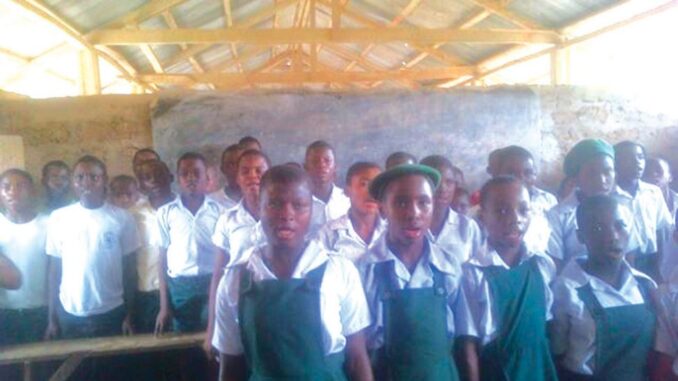
As Nigeria’s children mark their day on this very occasion, governments at all levels must find ways of addressing most of their nagging problems. Education today has seemingly moved from the known to the very remote considering all manners of policies unleashed into the system but which sadly appears to be doing untold damage to the whole sector.
Apart from the fact that the education planners in modern Nigeria seem bereft of ideas of how to move the sector forward convincingly in order for the nation to achieve its aim of building a virile education system that can compete favourably with other parts of the world, new policies being churned out only seem to show a clandestine move to destroy education from its very fabric.
To start with, nobody seems to be showing enough concern about the nation’s elementary section especially on the serious issue of the inability to read of most pupils of the primary schools being forwarded to the secondary schools. Year in year out, the situation has remained the same and even getting worse. Those in the second section also do whatever they can to justify their salary and then pushed their utterly poor product forward. Most of the nation’s public secondary schools are grossly understaffed and teachers therefore overburdened. Under such a condition, it will be unrealistic for anyone to expect optimum performances from the teachers.
Sadly, whenever the government chooses to recruit teachers, the process is thoroughly compromised and those with questionable qualifications find their ways into the system. Even the number of people recruited are always a far cry from the actual number needed and school heads can only complain at their own risk. Yet, all public junior secondary schools students are compelled to register compulsorily for all subjects including those in which they have no teachers perhaps to give the public a false impression that all is well. And miraculously too most of the schools often record a hundred percent pass in all their exams both internal and external, and the ‘miracle-favoured’ learners are pushed to the next level in a system akin to garbage in garbage out.
The greatest disservice done to students in junior secondary schools in modern times is the merging of the subjects they have to write in the exams simultaneously. How the education planners arrived at such a decision is difficult to understand because, in the years when students wrote the subjects separately, they still had many issues to contend with, how much more now that they are exposed to such a choking system? In the new arrangement, subjects such as Basic Science, Basic Tech, Physical and Health Education and Information Communication Technology are combined as Basic Science and Technology and the learners must sit for all of them at the same time. The same thing for the subject now called National Values studies involving, Social studies, Security education and Civics also written simultaneously. Prevocational studies include Home Economics and Agricultural science and students must also attempt them in one sitting.
The question one needs to ask is whether those who made this arrangement were exposed to the similar experience of writing exams in their own time, or what they hope to achieve by turning everything about the junior school into a mockery. Those in senior school do not fare any better. In spite of the fact their schools are without adequate teachers, they are hardly allowed to focus on their studies. There are just too many competitions they are compelled to take part in under the guise of involving them in co-curriculum activities and irrespective of whether or not most of those competitions have any bearing on the subjects the students offer. The modern government it seems is more interested in paparazzi to impress the public; no one actually seems to bother about whether or not the teeming Nigerians are acquiring proper education.
The question to ask is that if the competitions are truly good and helpful, why are those in the private schools not always involved? It is disheartening that in spite of the magnitude of laxity bedeviling public schools today, both parents and the government seem to be in agreement that all is well. Yet the result of failure to address the various forms of anomalies in the education sector is already staring everyone in the eyes. The number of unemployable graduates now roaming the streets will continue to increase unless Nigeria wakes up from its slumber and take the bull by the horns by putting its teeming children on the right path to excellence.
Oyewusi, an educationist and public affairs analyst lives in Lagos.
END

Be the first to comment